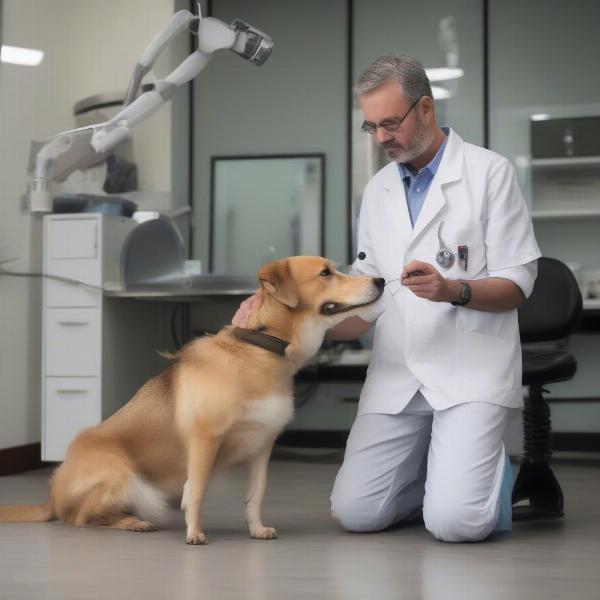Bee pollen has been buzzing around the health food scene for humans, but did you know it can offer potential benefits for your canine companion too? This golden dust, collected by bees from flowers, is packed with nutrients that might just give your dog a boost. From supporting the immune system to aiding in allergy relief, let’s explore the potential benefits of bee pollen for dogs.
Understanding Bee Pollen’s Nutritional Powerhouse
Bee pollen is a rich source of vitamins, minerals, amino acids, antioxidants, and enzymes. This potent combination can contribute to a dog’s overall well-being, supporting various bodily functions. It contains vitamins like B-complex, C, and E, as well as minerals such as potassium, magnesium, and calcium. These nutrients are essential for maintaining healthy skin, coat, energy levels, and a strong immune system.
Potential Benefits of Bee Pollen for Dogs
From bolstering immunity to providing allergy relief, bee pollen boasts a range of potential benefits for dogs:
- Immune System Support: The antioxidants in bee pollen can help protect cells from damage caused by free radicals, contributing to a stronger immune system and helping your dog fend off illness.
- Allergy Relief: Some proponents believe that bee pollen can help alleviate allergy symptoms in dogs by desensitizing the immune system to certain allergens. However, more research is needed in this area.
- Improved Energy Levels: The array of vitamins and minerals in bee pollen can provide a natural energy boost, making it a great addition to the diet of active dogs.
- Enhanced Digestion: Bee pollen contains enzymes that can aid in digestion, promoting better nutrient absorption and gut health.
- Skin and Coat Health: The nutrients in bee pollen can contribute to a healthy, shiny coat and can potentially alleviate skin irritations.
How to Introduce Bee Pollen to Your Dog’s Diet
Start by adding a small amount of bee pollen to your dog’s food, gradually increasing the dosage over time. It’s important to choose high-quality bee pollen from a reputable source to ensure purity and safety. Always consult with your veterinarian before adding any new supplements to your dog’s diet, especially if your dog has any underlying health conditions. They can help determine the appropriate dosage and monitor for any potential adverse reactions.
Precautions and Considerations
While bee pollen is generally considered safe for dogs, it’s crucial to be aware of potential risks and precautions:
- Allergies: Just as with humans, some dogs may be allergic to bee pollen. Start with a small amount and monitor for any signs of an allergic reaction, such as itching, swelling, or difficulty breathing.
- Quality Control: Choose high-quality bee pollen from a trusted source to avoid contamination with pesticides or other harmful substances.
- Dosage: Always follow your veterinarian’s recommendations for dosage to avoid potential side effects.
 Veterinarian Examining Dog
Veterinarian Examining Dog
Conclusion
Bee pollen offers a variety of potential benefits for dogs, from boosting immunity to supporting skin and coat health. While more research is needed to fully understand its effects, it can be a valuable addition to a balanced canine diet. Remember to consult with your veterinarian before introducing bee pollen to your dog’s diet and always choose high-quality bee pollen from a reputable source.
FAQ
- How much bee pollen should I give my dog? Consult your veterinarian for the appropriate dosage for your dog’s size and health condition.
- Can puppies eat bee pollen? It’s best to avoid giving bee pollen to puppies unless advised by your veterinarian.
- What are the signs of a bee pollen allergy in dogs? Watch for itching, swelling, hives, vomiting, or difficulty breathing.
- Where can I buy high-quality bee pollen for my dog? Look for bee pollen from reputable health food stores or online retailers specializing in pet supplements.
- Can bee pollen replace other supplements my dog is taking? No, bee pollen should not replace prescribed medications or supplements without veterinary approval.
- What should I do if my dog has an allergic reaction to bee pollen? Immediately discontinue use and contact your veterinarian.
- Is bee pollen a cure-all for dogs? No, bee pollen is not a cure-all. It should be used as part of a balanced diet and healthy lifestyle.
Related Articles
ILM Dog is a leading international dog website dedicated to providing expert advice on all aspects of dog care, from breed selection and nutrition to training and health. We offer a wealth of information to help you provide the best possible care for your canine companion. Whether you are a seasoned dog owner or just starting your journey, ILM Dog offers comprehensive resources and expert guidance. For any inquiries, please contact us via email at [email protected] or call us at +44 20-3965-8624.